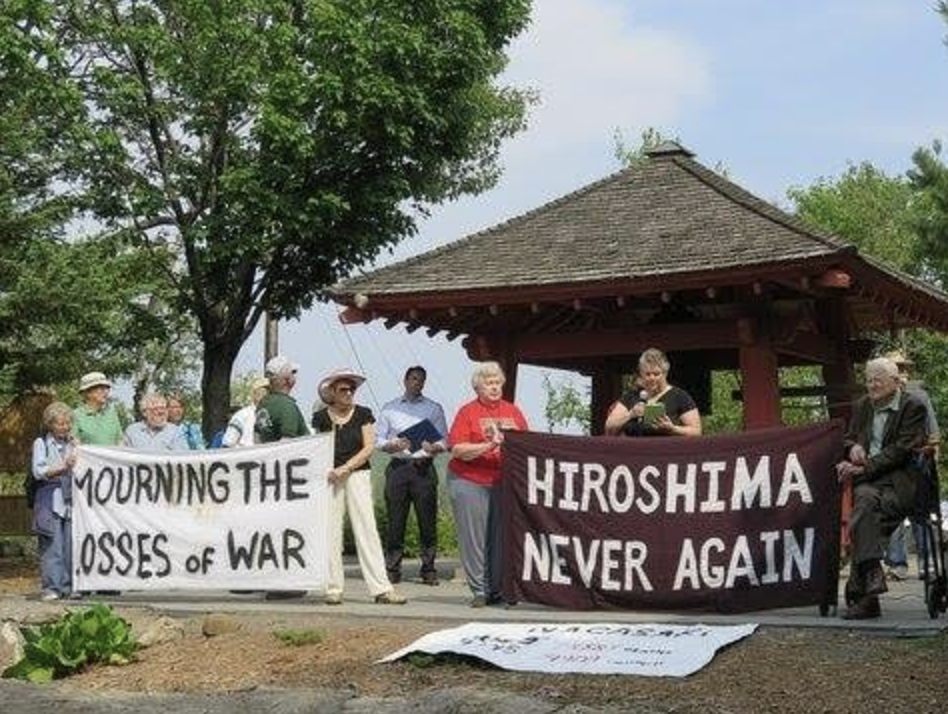Table of Contents
- Introduction
- News, and Other Relevant Links
- Related Organizations and Resources
- Featured Resolutions
For decades, Duluth, Minnesota has been committed to peacebuilding and cultivating strong international relationships.
Duluth’s commitment to peacebuilding, its strategic importance during the Cold War, and its dedication to cultivating strong international relationships make it a strong candidate to lead on nuclear disarmament issues. However, efforts have been met with the challenge of dueling perspectives on whether nuclear weapons are a local issue. On March 13, 2023, Duluth, Minnesota became one of the few U.S. cities to fail to pass a proposed Back from the Brink resolution. The resolution called on the federal government to join the Treaty of Prohibition of Nuclear Weapons (TPNW), and was proposed following the passage of similar resolutions in the nearby cities of Minneapolis and Saint Paul. Initiative for the resolution began with Veterans for Peace’s Golden Rule project, the restoration of the historic peace vessel that once sailed to protest U.S. nuclear testing in the Marshall Islands. Veterans for Peace’s “Great Loop” voyage kicked off in September of 2022 with a press conference in Duluth. Although the ship didn’t dock in Duluth, it served as inspiration for a movement to adopt a Back from the Brink resolution in the city. Supporters of the resolution emphasized the importance of encouraging local efforts to urge national action, along with highlighting the destructive nature of nuclear weapons. Opponents argued that nuclear weapons are not a local issue, nor a matter of concern for the people of Duluth.
Five days before the city council voted on the resolution, on International Women’s Day, demonstrators took to Duluth City Hall to rally in support of the resolution. At the rally, which was sponsored by the Duluth chapters of Grandmothers for Peace and the League of Women Voters, demonstrators urged the city council to pass the resolution in support of the TPNW. Instrumental to advancing the resolution was the Twin Ports Campaign to Abolish Nuclear Weapons (TPCan), a coalition of citizens and organizations advocating for nuclear disarmament and support of the TPNW, which partners with groups such as The Northland Grandmothers for Peace, League of Women Voters-Duluth, Veterans for Peace Chapter 80, Duluth Society of Friends, Peace and Justice Hub at Peace Church, and Back From the Brink, among other organizations.
In discussion of Resolution 23-0171R, Duluth’s Cold War history and airbase were considered. Duluth is home to the Air National Guard’s 148th fighter wing, which was active during the Cold War, along with the Duluth Air Defense Sector (DUADS) and the 24th Tactical Missile Squadron. Throughout the Cold War, the wing was integrated into the U.S. Air Force’s air defense network, which was fundamental to the Semi-Automatic Ground Environment (SAGE) System, a project to detect incoming hostile aircrafts using two large computers contained at the base. Duluth’s proximity to major manufacturing cities made it a strategic site to monitor air activity. However, this made Duluth a target for Soviet attack and led to the development of security measures, such as the placement of missiles nearby, including nuclear weaponry. Duluth’s Air National Guard wing, along with its international port and major steel exports, cause Duluth to be viewed as a potential target for nuclear attack.
Despite these factors, the resolution addressing nuclear disarmament failed to pass due to a tied vote. Councilors who voted against the resolution cited a lack of public interest, as well as the absence of input from potential targets of nuclear attack, such as the shipping port. Ultimately, multiple councilors viewed nuclear weapons as an issue of federal concern that doesn’t necessitate the inclusion of local governance.
Nonetheless, Duluth has worked for decades on peacebuilding practices through strong international relationships. Since 1986, the city has formed five influential sister city relationships. Of these sister cities, its relationships with Petrozavodsk, Russia and Ohara Isumi, Japan are of particular note. Duluth’s relationship to Petrozavodsk has fostered a rich exchange of collaborative youth, adults, arts, culture, and medical initiatives. These exchanges have included important programming to support at-risk children and families, focusing on the key areas of sex trafficking, fetal alcohol spectrum disorders, domestic abuse, child abuse, and raising emotionally healthy children. The relationship with Ohara Isumi, Japan began decades before the relationship was officially established, when the U.S.S. Duluth was stationed outside of Ohara Isumi during World War 2. At the end of the war, the unit brought a temple bell from Ohara back to San Francisco, which eventually found its way to Duluth. In 1951, when a group from Chiba University in Tokyo saw the bell on display at Duluth City Hall, they requested its return, and the mayor of Duluth honored their request. In 1993, four years after becoming sister cities, Ohara Isumi gifted Duluth with a replica of the bell, signifying the strength of their relationship. Further building its reputation as a peacemaking city, Duluth hosts a peace walk. This walking tour takes individuals through sites such as the Korean and Vietnam War Memorials and the Center for Non-Violence, to emphasize the role of individuals and communities in promoting peace. The peace walk project covers numerous other issues, from sister cities, to racism, to domestic violence.

Photo courtesy of Phil Anderson, Veterans for Peace Duluth.
News, and Other Relevant Links
Duluth City Council divided on stand against nuclear weapons
Duluth News Tribune (2023)
The Duluth Bear That Could’ve Blown Up the World
Racket (2021)
Local View: If peace is possible in Hiroshima, perhaps there’s hope here, too
Duluth News Tribune (2023)
Demonstrators call on Duluth to sign nuclear weapon treaty
Northern News Now (2023)
Related Organizations and Resources
Featured Resolutions
Public Meeting Summaries
RESOLUTIONS
city council meeting discussing Resolution 23-0171R
MARCH 13, 2023
This city council meeting discusses Resolution 23-0171R, including public comment and dialogue between council members. The resolution came to a tied vote, meaning it failed to pass. Public comment included statements from members of Veterans for Peace, Peace United Church of Christ, League of Women Voters, Grandmother’s for Peace, and local Duluth residents; of the 17 individuals that spoke on the resolution, only one was opposed. Comments ranged on topics from imagining a peaceful future for following generations, to Duluth’s position as a specific target for nuclear warfare. As co–sponsors of the resolution, council members Roz Randorf and Mike Mayou spoke in support, stressing how nuclear weapons are a local issue, and a direct concern for Duluth.
Numerous members of Grandmothers for Peace spoke, commenting on how public discourse has forgotten that nuclear weapons are issues for cities, and they should be seen as such. Charlotte Garner (23:30) stressed Duluth’s long history of passing advisory petitions, petitions that advocate for a specific issue and request further action. Many of the Grandmothers for Peace members spoke of imagining a future for their grandchildren, a future that as Karen Barchtorf (49:16) noted, realizes how beautiful the world is.
(13:50) Dorothy Wolden, a member of Grandmothers for Peace and former Duluth resident said:
“Nuclear weapons do not discriminate between military and civilian lives. The bombs the United States dropped on Hiroshima and Nagasaki incinerated pregnant women, infants at the breast, elders in prayer, and whole schools full of children. The only way to be sure this never happens again is to eliminate all nuclear weapons. We must each do our part. We cannot rely on experts or pass the responsibility to others.”
(38:45) Mary Faulkner, the President of Duluth’s chapter of the League of Women Voters, said:
“Here in Duluth, we know that local action can lead to national and even international change. This is a local issue. Cities often lead the way and serve as laboratories of democracy. Local city resolutions address national health policies and are an essential part of democratic governance. As the saying goes, peace begins at home. I ask you to support this resolution.”
(1:00:00) Philip Anderson, the President of Veterans for Peace in the Duluth Superior Area, expressed support for the resolution by framing the issue as a matter of waste. He commented on how the defense department is extremely wasteful, spending resources on things people do not need, cannot use, will not use. Directing his comments to the city councilors, he noted what the $1.7 trillion that goes towards nuclear weapons could do for the city of Duluth, and for Duluth’s city budget.
(1:03:30) Eric Smith was the only individual who spoke against the resolution during public comment. He exclaimed that the U.S. has a right to defend itself and that peace comes through strength — therefore, the U.S. needs a strong defense and more money should go into defense. According to Smith, nuclear weapons are a federal issue.
(1:16:53) Towards the end of public comment, Ira Helfand, MD, member of the International Campaign to Abolish Nuclear Weapons (ICAN), commented in support of the resolution. He called on the US to exercise leadership and provided Robert McNamara’s quote on how we’re alive not because of wise leaders, but because “in the end we lucked out. It was luck that prevented nuclear war.” Helfand stated:
“We can’t know that this effort will be successful even if the United States adopts this policy,” he continues, “But there’s no reason not to try, because we do know what’s going to happen if we fail.”
(1:29:04) Public comment came to a close, and the resolution entered discussion.
(1:30:32) Councilor Randorf highlighted the relevance of the resolution to the council. She commented on the council’s collective belief in peace and love for their families and place. As an elected official, she said she represents the interests of citizens, and that she views this resolution as an appropriate and relevant issue, as it gives residents a voice to propel state and federal action.
(1:32:43) Councilor Mayou, a co-sponsor of the resolution, spoke about Duluth as a target for nuclear weapons. Home to the military base, 148th fighter wing, and an international port responsible for U.S. steel exports, Mayou commented that Duluth is a target for nuclear warfare. He called attention to the tax burden of maintaining a nuclear arsenal, and the significance of those funds as a local issue.
(1:36:23) Councilor Kennedy, City Council President, advocated against the passage of the resolution. She remarked on the lack of voices in the conversation, pointing to the absence of comments from the shipping port and other groups supposedly impacted by potential nuclear warfare. Additionally, she noted that as the representative for District 5, she has not heard from her constituents a desire to pass the resolution.
(1:42:11) Councilor Forsman commented against the resolution, stating that he doesn’t view nuclear weapons as a local issue.
(1:42:50) Roll call vote on the resolution. With a tied 4-4 vote, the resolution failed to pass.
Yea: 4 – Councilor Anderson, Councilor Awal, Councilor Mayou and Vice President Randorf
Nay: 4 – Councilor Alstead, Councilor Forsman, Councilor Hobbs and President Kennedy
Absent: 1 – Councilor Tomanek
Public comment in this video was combined with that for a proposed roundabout and a resolution on the construction of a skatepark.

